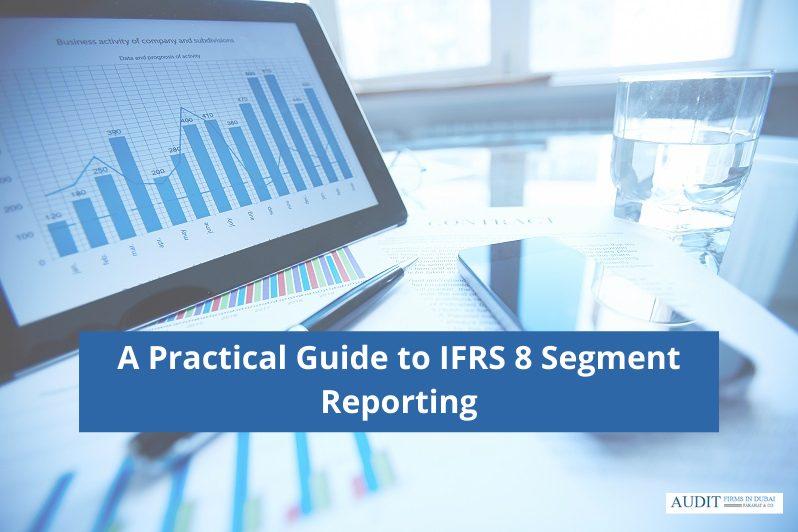IFRS 8 focuses on financial statements of any company in Dubai & UAE whose equity instruments or debt are traded in public markets or wants to issue instruments in a public market. Through the assistance of audit firms in Dubai & UAE, companies can make disclosures based on IFRS 8 if the disclosures are regarded as segment information.
Identifying Operating Segments
According to IFRS 8, the operating segment is a component of an entity that is characterized by revenue-earning business activities. A senior decision-maker in a company often analyzes the operating results. Note that IFRS 8 does not define a senior decision-maker. It only describes a function instead of a title. In some Dubai & UAE companies, the function could be managed by a group of directors instead of an individual for sensitive financial data.
This definition highlights that not every part of a company is an operating segment. The standard explains the example of a company headquarters that earn incidental revenues or earns nothing at all and will not be an operating segment.
Some audit enthusiasts have complained about the management approach as leaving segment identification a lot to the discretion of the Dubai entity and so compromising comparability between financial statements of various companies in Dubai and UAE.
Read also: Audit Services In UAE : An Overview Of IFRS 8 Principles
Who Should Apply IFRS 8
Every company in Dubai & UAE:
Whose equity or debt instruments are traded publicly or are filing their financial information with securities organizations or other bodies in charge of trading instruments on the public market. This move applies to independent and consolidated financial statements.
Reportable Segments
Some segments are not reportable. The following must be reported separately if at least a single quantitative threshold is met by a segment or a group of segments as per stipulated criteria:
During the segment's sales period, the segment's total revenue (including external revenues and intersegment revenues) exceeds 10% of the total revenue of all the segment's business units.
There is at least a 10% difference between the segment's reported profit or loss and the combined reported loss of all operating elements that didn't report a loss.
Its assets comprise at least 10% of all segments' combined assets. Through the assistance of audit services, management can still decide to present segments separately even if they do not meet any of the above thresholds.
Reportable Segments: A Few More Rules
At least 75% of the entity's revenue must be included in reportable segments if external revenue represented by operating segments is less than the total external revenue generated by operating segments.
Those activities and operations that could not be reported may be incorporated and reported based upon an independent section known as “All Other Segments.”
Reporting more than ten segments may not be feasible. If the information is too detailed, the entity should reconsider reporting it.
The management should restate the comparative information for the previous audit report period if the new segment was identified based on quantitative thresholds in the current reporting period.
Information to Be Disclosed
The entity must disclose the following information once a segment has been identified as reportable:
Here is some general information:
- Factors that determine whether an operating segment deserves reporting.
- The approach used in executing the aggregation criteria.
- Information about assets and liabilities, profit or loss.
The principal decision-maker should be informed that the amounts are measured the same way.
In addition to total profits, losses, assets, and liabilities, the entity shall present information about specified revenues and expenses. In other words, revenues from external customers, internal revenues, depreciation, and others.
It is the internal audit professional’s responsibility to explain the measurement basis, including the reasons for discrepancies between amounts reported per segment and total amounts of the entity.
Reconciliations
The company audit specialists must reconcile total amounts reported in its financial statements with total amounts per operating segment.
- Assets
- Liabilities
- Revenues
- Profit or loss
- Other material details.
- Entity-wide details
- Details about products and services
Details about geographical places namely:
- Revenues from external clients in the UAE and other foreign nations.
- Some non-current assets in UAE and other countries.
Details About Big Customers
The conclusion in this analysis was that a smooth endorsement of IFRS 8 would get rid of uncertainty about the handling of financial statements as of December 31st, 2007, and support the UAE objective of IFRS being acknowledged in various jurisdictions without the need for reconciliation.
Are you a business or organization in Dubai or the UAE and are looking to adopt IFRS 8? Or need professional guidance on IFRS 8? Audit firms in Dubai can help you with audit and accounting needs. To learn more about our services, visit our website. You can also contact us through email or call for more details.
Read also: Latest IFRS Updates And Changes For Audit Firms In Dubai
Umapathy Anuruthan, is a Senior Auditor at the firm, holds a Business Management Degree and carries with him an experience of 6+ Years, having worked in two of the Big 4 audit firms. He has a ‘hands-on’ understanding of external audits and financial reporting and is well-known for his approach to ensuring the highest quality and accuracy in audits for clients of numerous industries.
